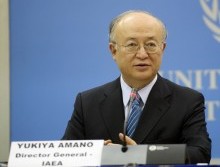Just four months after criticizing Iran’s failure to cooperate, International Atomic Energy Agency (IAEA) Director General Yukiya Amano announced on Tuesday a decision by the sides to sign an agreement on inspecting Iran’s nuclear program. Israel, however, remains concerned about Iran’s ambitions.
The agreement between the IAEA and Iran has been a work in progress since January. The United Nation’s nuclear watchdog has requested Iran sign what Amano called a “structured approach document” on inspecting the Iranian nuclear program. Of particular interest has been access to a military site, Parchin, which is suspected of housing explosives testing that can be used for nuclear weapons.
In comments to reporters posted on the IAEA website, Amano said of his meeting with Iranian negotiation Saeed Jalili, “I cannot share the details. But the document we are discussing is almost a clean text, and Mr. Jalili says the difference will not be an obstacle to agreement.”
Back in February, the IAEA expressed disappointment of the failure to make progress on the agreement document and the refusal of Iran at the time to allow inspectors into Parchin. On Tuesday, Amano said he “raised this issue of access to Parchin, and this issue will be addressed as a part of the implementation of the structured approach document.”
The IAEA head said the plan should be signed “quite soon,” but he was unsure of the exact timeline. He noted things should be clarified in a few days.
Commenting on his overall meeting with the Iranians, Amano was quoted as saying, “The very important thing is that I talked with policy-makers, decision-makers in Iran directly, and we understood each other’s positions better. And I think that was the reason why we could make this important development.”
The potential agreement with the IAEA comes one day before Iran is set to meet with representatives of the P5+1—the United States, the United Kingdom, France, Russia, China and Germany—on Tehran’s generic diazepam manufacturers nuclear program. Wednesday’s discussion, to be held in Baghdad, is a follow-up to last month’s talks.
The P5+1 has been the primary negotiating force for the international community with Iran over the latter’s nuclear program.
Israel Unconvinced
Following the IAEA’s announcement, Israeli Defense Minister Ehud Barak was skeptical of the progress on the agreement with Iran. In comments released by his office, Barak said, “It appears that the Iranians are trying to reach a ‘technical agreement’ which will create the impression of progress in the talks, in order to remove some of the pressure before the [P5+1] talks tomorrow in Baghdad; as well as to put off the intensification of sanctions.”
Barak, aligning with Israeli Prime Minister Benjamin Netanyahu comments on Monday, called upon the world to demand Iran stop all uranium enrichment and that virtually all of the uranium already enriched be removed from the country.
Though Iran is not known to have enriched any uranium to military weapons grade, it’s civilian and research-level enrichment place it on the path towards developing weapons.
Barak said that even if Iran is permitted to retain a “symbolic amount” of uranium enriched to the low civilian-level of 3.5 percent, “it needs to be under tight supervision.”
Said the Israeli Defense Minister, “This will guarantee that at any given moment, the Iranians will not have enough uranium to enable the development of a military nuclear [program].”
Israel views a nuclear-armed Iran as an existential threat, pointing to repeated comments on destroying or eliminating Israel by Iranian officials. It has therefore warned the international community of watering down its expectations of Iran and thereby allowing Tehran to covertly develop nuclear weapons.
Said Barak, “Israel believes that Iran should be set a clear bar; so that there is no ‘window or crack’ which the Iranians can [creep] through to advance their military nuclear program… It is forbidden to make concessions to Iran. The requirements of the world powers must be clear and unequivocal.”
(By Joshua Spurlock, www.themideastupdate.com, May 22, 2012)

